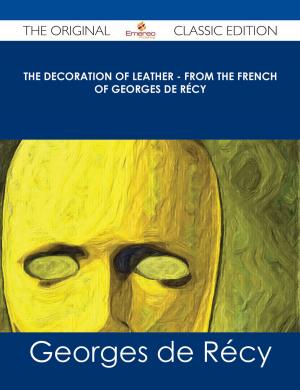Latin For Beginners - The Original Classic Edition
Nonfiction, Reference & Language, Reference, Fiction & Literature| Author: | d'Ooge Benjamin | ISBN: | 9781486410446 |
| Publisher: | Emereo Publishing | Publication: | October 24, 2012 |
| Imprint: | Emereo Publishing | Language: | English |
| Author: | d'Ooge Benjamin |
| ISBN: | 9781486410446 |
| Publisher: | Emereo Publishing |
| Publication: | October 24, 2012 |
| Imprint: | Emereo Publishing |
| Language: | English |
This is a high quality book of the original classic edition.
This is a freshly published edition of this culturally important work, which is now, at last, again available to you.
Enjoy this classic work. These few paragraphs distill the contents and give you a quick look inside:
Part II carries the work through the first sixty lessons, and is devoted to the study of forms and vocabulary, together with some elementary constructions, a knowledge of which is necessary for the translation of the exercises and reading matter.
...The Latin language, meaning the language of Latium, was spoken by the ancient Romans and other inhabitants of Latium, and Latin was the name applied to it after the armies of Rome had carried the knowledge of her language far beyond its original boundaries. As the English of to-day is not quite the same as that spoken two or three hundred years ago, so Latin was not always the same at all times, but changed more or less in the course of centuries.
...The Normans spoke French?which, you remember, is descended from Latin?and spread their language to a considerable extent over England, and so Norman-French played an important part in the formation of English and forms a large proportion of our vocabulary.
...In English we have three cases,?nominative, possessive, and objective; but, in nouns, the nominative and objective have the same form, and only the possessive case shows a change of ending, by adding s or the apostrophe.
This is a high quality book of the original classic edition.
This is a freshly published edition of this culturally important work, which is now, at last, again available to you.
Enjoy this classic work. These few paragraphs distill the contents and give you a quick look inside:
Part II carries the work through the first sixty lessons, and is devoted to the study of forms and vocabulary, together with some elementary constructions, a knowledge of which is necessary for the translation of the exercises and reading matter.
...The Latin language, meaning the language of Latium, was spoken by the ancient Romans and other inhabitants of Latium, and Latin was the name applied to it after the armies of Rome had carried the knowledge of her language far beyond its original boundaries. As the English of to-day is not quite the same as that spoken two or three hundred years ago, so Latin was not always the same at all times, but changed more or less in the course of centuries.
...The Normans spoke French?which, you remember, is descended from Latin?and spread their language to a considerable extent over England, and so Norman-French played an important part in the formation of English and forms a large proportion of our vocabulary.
...In English we have three cases,?nominative, possessive, and objective; but, in nouns, the nominative and objective have the same form, and only the possessive case shows a change of ending, by adding s or the apostrophe.















